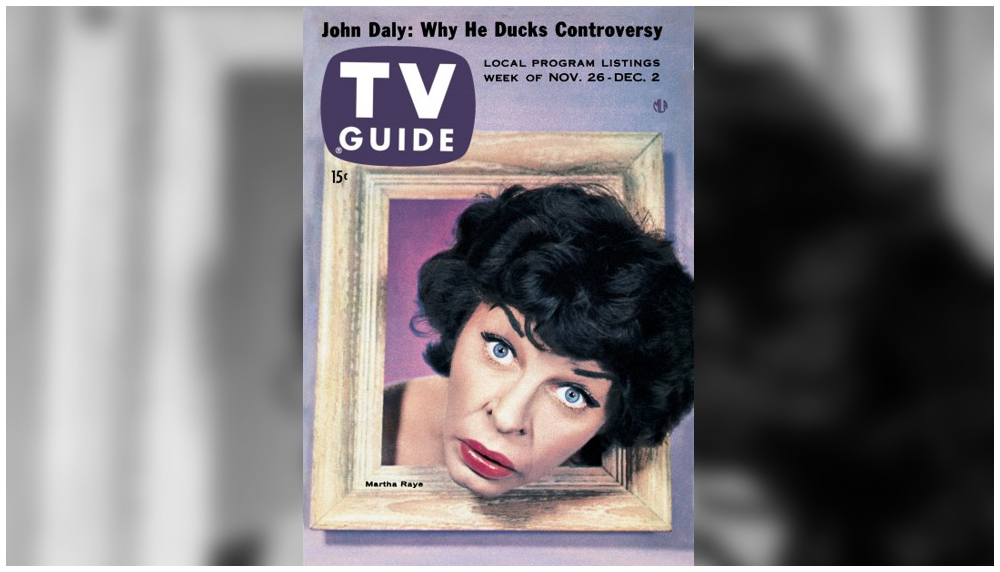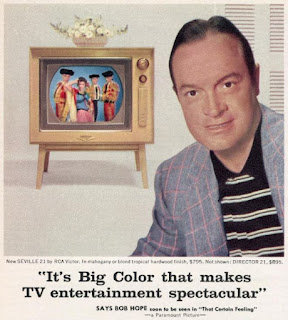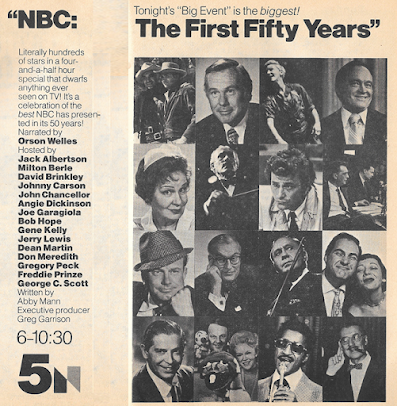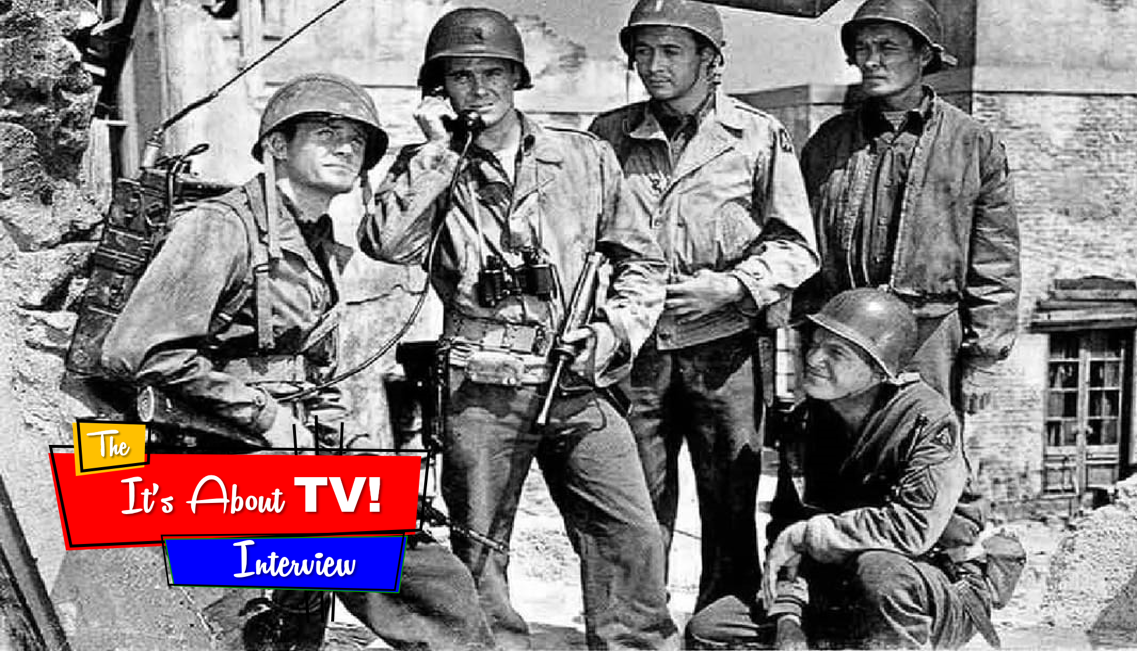True story: I was leafing through the pages of today's issue, getting ready to do some typing, and I started reading out loud some of the blockbuster programs that were on. Parades! Football! NBC's anniversary special! What a terrific week, I said.
"You must have been in seventh heaven," my wife said.
My face clouded over. "This is while I was living in the World's Worst Town™, remember?"
"Oh," she said after a moment.
It occurred to me then that it had been awhile since I’d had a really good rant about the World’s Worst Town™, and I was overdue for one. Now, I realize you didn't come here to listen to me gripe about this, but that's what you're going to do anyway, at least for the next few minutes. The WWT, we'll call it for the sake of convenience, is the small town in which I spent the so-called formative years of my life, from ages 12-18. While we lived there, we had access to one commercial television station, an NBC/ABC affiliate. There was a PBS station. On occasion there was a snowy picture from an out-of-state CBS affiliate. And that was it, which meant that 90 percent of our television viewing was restricted to NBC. For someone who may have been a descendent of Mike Teavee, it was—well, I don't really have the vocabulary to describe what it was like, at least not that I can use here.
I will allow as to how this arrangement did have one benefit this week: I was able to watch NBC's magnificent 50th anniversary show (Sunday, 6:00 p.m.) The four and one-half hour program, narrated by Orson Welles and featuring just about every living star who's ever appeared on the network, goes all the way back to the days of radio, and because television itself only makes up about have of the history, the program doesn't suffer from the recency bias that plagues so many of these kinds of shows today. Looking through some of the highlights, you get a really impressive look at the breadth of NBC's hits over the years:
Rowan and Martin's Laugh-In; This is Your Life; Kukla, Fran and Ollie; The Wonderful World of Disney; Bonanza; The Tonight Show; Peter Pan; the
Halmark Hall of Fame; Milton Berle's
Texaco Star Theater; Mutual of Omaha's Wild Kingdom; Martin and Lewis on
The Colgate Comedy Hour; Dr. Kildare—among others. There are also highlights of Rose Bowls and World Series, the moon landing and the JFK assassination, Dean Martin and Frank Sinatra, Rudy Vallee, and Bob Hope. The program ends with a tribute to David Sarnoff.
Ellen Torgerson's accompanying article shows how difficult it is to put together a program like this; it was over a year in the making, and the video archives weren't nearly as helpful as producer Greg Garrison would have liked. "We found lots of things missing, or they'd been erased or given away or stolen. And one of the warehouses was destroyed by fire." The storage building in New Jersey contained thousands of cans of film; they were labeled, all right, but there was no cataloging system, which meant "it might have taken 10 years to look through all those tins of tape to find, say, Grace Kelly in Lights Out." Garrison recounts the search for a color print of a 1957 Gene Kelly special with Donald O'Connor. A black-and-white print was located in Akron, but Garrison really wanted color. Finally, six weeks before the show, and resigned to using the B&W clip, Garrison was out shoveling hay in the barn of his horse farm, "and under an old pule of hay I found this box. There it was, a color print of the Kelly show, right in my own barn." He'd stored tapes of all the shows he'd produced in the rafters of the barn, and this one had fallen through an opening and into a bale of hay, unnoticed until his cleaning. It may have been a lot of work putting the special together, but it's worth it.
All three broadcast networks would arrive at milestone anniversaries in the next a couple of years, and each one approached their anniversary programs in different ways. CBS spread their celebration over an entire week, devoting each night to a particular genre; ABC, which had no radio history to speak of and was recognizing its 25th anniversary, put on a show that was more like a series of tributes at an awards show, with a live audience to boot. The NBC celebration is a show apart, though; with a script by Oscar winner Abby Mann, it combines gravitas, celebrity and history, and brings home the storied legacy of the Peacock Network. If nothing else, I'm grateful to the WWT for giving me the chance to see it.
l l l
As I said, it's a very, very good week of television; Thanksgiving week was often that way. The college football season's almost over, so you've got plenty of big games between big rivals. There are plenty of specials on—movies, variety shows, and the like; there's so much to look at that I've decided to treat Thanksgiving Day itself separately, on Monday.
And, as I've progressed through this issue, it happens that I'm able to judge pretty much everything about this week based on whether or not I had access to it in the WWT. That's the key, I think; not that I would have watched it, but that I could have if I'd wanted to. For instance, I'm pretty sure that KCMT carried the Big Ten showdown between Michigan and Ohio State (Saturday, 11:45 a.m., ABC)—it was pretty good at picking up college football from ABC. (I'm not sure about the second half of the doubleheader, USC vs. UCLA, though.) KCMT even played fast and loose with NBC programming; it never carried Saturday Night Live (10:30 p.m., this week with host Paul Simon and musical guest George Harrison), instead substituting a local movie. I'm not quite sure what the motive was; it could have been the ad revenue generated by local commercials, or the station might have thought that the show's content was in poor taste, too "adult" for rural audiences. (If I had to bet cash money, I'd put it on the second explanation, because SNL wasn't recorded and played back later—it just wasn't shown period.) NBC's Saturday Night at the Movies is Billy Jack (8:00 p.m.), and that's probably what we watched, even though Judith Crist calls it "primitive" and says it "manages to insult every segment of society, as well as the intelligence of its devout audience."
As I mentioned in the lede, I did get to see that NBC anniversary special, which means I passed up Sunday's Hallmark Hall of Fame, which ironically aired this season on PBS instead of NBC, its longtime home. All the presentations this season were celebrating the Bicentennial, and this one is "The Rivalry," a dramatization of the Lincoln-Douglas debates, with Arthur Hill as Abraham Lincoln, Charles Durning as Stephen Douglas, and Hope Lange as Mrs. Douglas. (9:00 p.m.) Now, I'm not positive that this would have been carried on KWCM, the PBS affiliate we got; it was kind of funky in what it did and didn't show, compared to its counterpart in the Twin Cities. I don't think I've ever seen "The Rivalry," in fact; I wonder if it's on YouTube. (Checking.) Nope, apparently not. Still, I'll look around if I have time later.
Arthur Hill's also on
Little House on the Prairie Monday night (7:00 p.m., NBC).
Little House wasn't a favorite in this house, though, so I probably was in my room doing homework. No
Charlie Brown Thanksgiving* or Bugs Bunny and Daffy Duck in
Carnival of the Animals, of course
(starting at 7:00 p.m., CBS), and KCMT wouldn't pick up
Monday Night Football unless the Minnesota Vikings were on, so you can forget the Baltimore Colts-Miami Dolphins game as well. (8:00 p.m., ABC) Instead, the TV-movie is
The Savage Bees, with Ben Johnson and Michael Parks (8:00 p.m., NBC). Yep, homework.
*We have A Charlie Brown Thanksgiving on DVD, so we can watch it whenever we want. It's not the best of the Peanuts specials, though, so we don't usually watch it. Another case of irony, I suppose.
KTCA, the PBS affiliate in the Twin Cities, has a solid lineup on Tuesday; I don't know if KWCM carried it or not. One of the highlights is Mark Russell's post-election musical-comedy review (8:30 p.m.). Russell was one of the most astute, and funniest, political satirists around, an equal-opportunity humorist who puts someone like Art Buchwald to shame, and I thoroughly enjoyed watching his shows over the years until politics became too discouraging to be funny anymore. Anyway, I suspect Russell has a field day with Jimmy Carter's election; Carter always provided Russell with a lot of material. That's followed at 9:00 p.m. by Ingmar Bergman's magnificent The Seventh Seal. I probably wouldn't have watched that back then; I mean, I was precocious, but not that precocious, and besides, it would have run past my bedtime, but I own it today. No, if I watched anything, it would have been Police Woman (8:00 p.m., NBC). I don't think I'd watch it today, but you have to remember that back then I was a 16-year-old male, so you have to give me credit for that.
Wednesday night's NBC TV-movie is Irwin Allen's
Flood, with Robert Culp, Martin Milner, Barbara Hershey, Teresa Wright, Carol Lynley, and Roddy McDowall (7:00 p.m.). There's a reason why NBC's TV-movies aren't usually remembered with the same affection and nostalgia as ABC's
Movie of the Week, and maybe this is one reason why: "An overwhelming action-spectacle about an overwhelming disaster that swept through the lives—and revealed the lies—of a whole city!" I don't know; maybe it's really good! Or maybe those ABC movies weren't all that people remember them to be—remember, I didn't get to see them. Tonight is better-remembered for what wasn't available:
The French Connection (8:00 p.m., CBS), which Judith Crist describes as "a milestone police-chase movie and a remarkable feat of filmmaking." The film, director William Friedkin, and star Gene Hackman all took home Oscars. And then there's
Charlie's Angels (9:00 p.m., ABC; part of a big lineup that includes
The Bionic Woman and
Baretta): "Jill applies as a centerfold candidate for a girlie magazine that had its two previous centerfolds murdered." C'mon—Farrah Fawcett-Majors as a centerfold? I ask you, who's going to believe that?
Since you'll have to wait until Monday to read about Thanksgiving in detail—I'll have today's rant out of my system by then—I'll only point out that it was a very good day; the parade, football, turkey with all the trimmings. Nothing to complain about there, and who would want to complain, anyway? It's a day to be thankful for what you have, not dwell on what you don't have. (Still, you'll see that we missed a lot.)
And that brings us to Friday, the bonus day-off that's so great when you're a kid (and isn't bad when you're an adult, either, which might mean I haven't grown up yet). One of the big college football games of the year is the annual day-after-Thanksgiving* battle between Nebraska and Oklahoma, one that used to decide the Big 8 title each season. It's on ABC at 1:15 p.m. I had to listen to it on the radio, which I was able to swing by getting a fairly clear signal from a Nebraska radio station. The same applied to the nighttime half of the doubleheader, Penn State vs. Pittsburgh. (8:00 p.m.) It was harder finding a Pennsylvania radio station, but I was able to do it. Let's see; what else wasn't on? There's the animated adaptation of the beloved children's story Charlotte's Web (7:00 p.m., CBS), featuring the voices of Debbie Reynolds, Henry Gibson, Paul Lynde, Agnes Moorehead, and others (7:00 p.m, CBS). There's the All-Star Tribute to John Wayne (7:00 p.m., ABC), with appearances by Bob Hope, Angie Dickinson, Claire Trevor, Ron Howard, Lee Marvin, James Stewart, Sammy Davis Jr., Maureen O'Hara, and host Frank Sinatra. Plus. there are some great film clips There's the sequel to The French Connection, aptly titled The French Connection II (8:00 p.m., CBS) which still has Gene Hackman, but little else; Judith Crist says it's "not only resistible but repugnant, a botched, pointless and plodding film that thunks its way through detestable personalities and sadomasochistic details to an incredible ending." So I guess it was OK to miss it. Opposite that, KCMT offers The Lawrence Welk Show (6:30 p.m.), Chico and the Man (7:30 p.m.), The Rockford Files (8:00 p.m.), and Dean Martin's roast of Redd Foxx (9:00 p.m.). No evening that includes Jim Rockford can be all bad.
*One of the reasons ABC scheduled big games like this on the day following Thanksgiving was because of a little-known exception to the limit on how many times a team could appear on national television over a given period. Games played on days other than Saturday didn't count, as I recall, giving times like Nebraska and Oklahoma a bonus appearance.
Oh, and if we're talking about bad television, we should mention the MST3K alert: Plan Nine from Outer Space (Friday, 3:30 p.m., WCCO). "Space aliens enlist the aid of the dead in trying to conquer the universe." Bela Lugosi, Lyle Talbot, Vampira. It wasn't on MST3K, but the Rifftrax gang did this live a few years ago. It's widely considered one of the worst movies ever made; since I didn't see this in the WWT, perhaps the week was better than I thought!
OK—time to take a deep breath, step back, and pull myself together. Perhaps I got just a little carried away with that last bit. Let's take a look at what else there is in this week's issue.
Doug Hill has a very nice article on Charles Kuralt—hopeful, even, for as he puts it, "Kuralt's reports from the church-supper, county-fair beat suggest that while journalism is crisis-ridden, America is not." That's an important message to hear; the country was going through a hard time in 1976, with the Cold War still strong, the wound from the Nixon resignation still fresh, and a very narrow presidential election just having concluded. Inflation, unemployment, and interest rates were all high, and morale was low. But as Kuralt points out, "I think that 'On the Road' should be irrelevant—uttterly. It serves to remind people that there are people besides politicians and entertainers and criminals [all one and the same, aren't they?] in the country." Kuralt has been doing his "On the Road" feature on the
CBS Evening News since 1967; I always used to enjoy those whimsical pieces—back when we actually had CBS, of course. Now that we're in the WWT, where we don't get CBS—
No, wait, wait! Don't go there again! Get your mind off it, do you hear! (Takes deep breath.) Sorry about that. I don't know what came over me. Here's another look at what goes on behind the scenes: Frank Sean Swertlow's story on the "elite squad of New York's finest" delegated to keep TV stars out of trouble while doing location filming. "There are 15 police officers and four sergeants in the group," Swertlow writes, "with a lieutenant in charge. And one of the missions is to make sure all the production is done without inconveniencing millions of residents." One of those productions is Kojak, and the squad has its hands full—not just keeping the crowds away from Telly Savalas, but also keeping Telly away from them, especially the ladies. "Telly is a real ladies' man," says Lt. Paul Glanzman of the actor who headlines CBS's hit detective series—
A series I can't watch, right? Because it's not shown where I live! (Takes another deep breath.) I'm sorry again. I've really got to stop all this. It's not healthy, and it isn't doing anyone any good, especially me. Let's read about something more relaxing, funny even. Stephen Rubin talks to Beverly Sills and Carol Burnett about their holiday special at the Metropolitan Opera House on Thanksgiving night. They'd never worked together, or even met, until Burnett picked up the phone and asked Sills if she'd like to work with her on a special. The two clicked from the very beginning, and they make a delightful pair; "I'm having the time of my life," Beverly exclaims, while Carol "nearly fainted" when Sills told her she couldn't wait until they got started. Apparently the audience at the Met agreed, enthusiastically responding throughout the special, taped last March for . . CBS . . .
All right, that's it! I give up! You win, World's Worst Town™! Even though it's been 46 years, you still have the power to bring me to my knees! How you nearly ruined my adolescence, stunted my cultural growth, deprived me of some of the simple pleasures of life. No, I can't let it go! I need to see Dr. Raymer or Dr. Thompson from that ABC series Breaking Point. Wait, they wouldn't have shown that either! (Collapses sobbing, a broken man.)
l l l
 |
| NBC's year got off to a bad start |
I feel much better now, thank you. What this little exercise accomplished, besides allowing me to vent my spleen, is the frustration that any TV connoisseur would have experienced during a week where most of the best programs were unavailable. With the exception of Sunday night (due to the NBC anniversary show), one could arguably claim that what NBC had to offer was inferior every night of the week. As evidence, I submit the list of
top-rated programs of 1976-77; of the top 30 shows, NBC had only
four, with one of those being
Monday Night at the Movies and another being
The Big Event, the umbrella title given to Sunday night specials from the World Series to, well, the NBC 50th anniversary show. The only two actual series to make the list were
Little House on the Prairie and
Sanford and Son; and KCMT, in its provincial way, preempted
Sanford for
Lawrence Welk.
In a way, I have only myself to blame for this, and in recognition of this, I can only throw myself on the mercy of the court—you, my readers. As I've said, I was already committed to television by then, and so the culture shock of moving to the World’s Worst Town™ would have affected anyone in my position. Had I grown up with only one television station, things might have been different. You could also argue that I attach too much importance to television, and you'd probably be right about that as well, but on the other hand, if not for that, you wouldn't be reading this now. (All right, that's a push.)
However, had there not been others like me, there wouldn't have been the push for cable television in rural areas. There wouldn't have been the evolution of pay-TV, the explosion of cable networks, the exponential increase in televised sports, the demand by the consumer for more choice. And that's what it all boils down to: choice. I'm not saying I would have watched all those shows on other networks, had I had the choice; it's that I didn't have the choice. And it's not as if I didn't know what I was missing, because thanks to TV Guide, I did know.
What's ironic about it, I guess, is that now, with more stations than ever to choose from, I hardly watch any current TV. The programs I do watch are mostly from the classic era, and some of them are shows I chose not to watch when they were originally on. Maybe I'm just not as dependent on TV as I used to be, and that's something I can truly be thankful for. TV


































